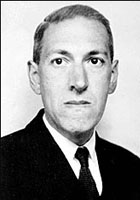Howard Phillips Lovecraft
Howard Phillips Lovecraft Poems
The thing, he said, would come in the night at three
From the old churchyard on the hill below;
But crouching by an oak fire's wholesome glow,
...
O'er the midnight moorlands crying,
Thro' the cypress forests sighing,
In the night-wind madly flying,
Hellish forms with streaming hair;
...
Through the ghoul-guarded gateways of slumber,
Past the wan-mooned abysses of night,
I have lived o'er my lives without number,
...
There's an ancient, ancient garden that I see sometimes in dreams,
Where the very Maytime sunlight plays and glows with spectral gleams;
...
I. The Book
The place was dark and dusty and half-lost
In tangles of old alleys near the quays,
...
In the Midnight heaven's burning
Through the ethereal deeps afar
Once I watch'd with restless yearning
An alluring aureate star;
...
Little Tiger, burning bright
With a subtle Blakeish light,
Tell what visions have their home
In those eyes of flame and chrome!
...
The cottage hearth beams warm and bright,
The candles gaily glow;
The stars emit a kinder light
Above the drifted snow.
...
Babels of blocks to the high heavens towering
Flames of futility swirling below;
Poisonous fungi in brick and stone flowering,
...
Black loom the crags of the uplands behind me,
Dark are the sands of the far-stretching shore.
Dim are the pathways and rocks that remind me
...
Eternal brood the shadows on this ground,
Dreaming of centuries that have gone before;
Great elms rise solemnly by slab and mound,
...
The cloudless day is richer at its close;
A golden glory settles on the lea;
Soft, stealing shadows hint of cool repose
...
It was golden and splendid,
That City of light;
A vision suspended
In deeps of the night;
...
How dull the wretch, whose philosophic mind
Disdains the pleasures of fantastic kind;
Whose prosy thoughts the joys of life exclude,
...
A FA Fable
Luxus tumultus semper causa est.
Lucullus Languish, student of the skies,
And connoisseur of rarebits and mince pies,
...
I am a peaceful working man,
I am not wise or strong,
But I can follow Nature's plan,
In labour, rest, and song.
...
We are the valiant Knights of Peace
Who prattle for the Right:
Our banner is of snowy fleece,
Inscrib'd: 'TOO PROUD TO FIGHT!''
...
The steeples are white in the wild moonlight,
And the trees have a silver glare;
Past the chimneys high see the vampires fly,
...
How sad droop the willows by Zalal's fair side,
Where so lately I stray'd with my raven-hair'd bride;
...
The hours of night unheeded fly,
And in the grate the embers fade;
Vast shadows one by one pass by
In silent daemon cavalcade.
...
Howard Phillips Lovecraft Biography
Howard Phillips Lovecraft (August 20, 1890 – March 15, 1937) was an American author of horror, fantasy, and science fiction, especially the subgenre known as weird fiction. Lovecraft's guiding literary principle was what he termed "cosmicism" or "cosmic horror", the idea that life is incomprehensible to human minds and that the universe is fundamentally alien. Those who genuinely reason, like his protagonists, gamble with sanity. As early as the 1940s, Lovecraft had developed a cult following for his Cthulhu Mythos, a series of loosely interconnected fiction featuring a pantheon of humanity-nullifying entities, as well as the Necronomicon, a fictional grimoire of magical rites and forbidden lore. His works were deeply pessimistic and cynical, challenging the values of the Enlightenment, Romanticism, and Christian humanism. Lovecraft's protagonists usually achieve the mirror-opposite of traditional gnosis and mysticism by momentarily glimpsing the horror of ultimate reality and the abyss. Although Lovecraft's readership was limited during his life, his reputation has grown over the decades, and he is now regarded as one of the most influential horror writers of the 20th century. According to Joyce Carol Oates, Lovecraft — as with Edgar Allan Poe in the 19th century — has exerted "an incalculable influence on succeeding generations of writers of horror fiction". Stephen King called Lovecraft "the twentieth century's greatest practitioner of the classic horror tale.")
The Best Poem Of Howard Phillips Lovecraft
The Messenger
The thing, he said, would come in the night at three
From the old churchyard on the hill below;
But crouching by an oak fire's wholesome glow,
I tried to tell myself it could not be.
Surely, I mused, it was pleasantry
Devised by one who did not truly know
The Elder Sign, bequeathed from long ago,
That sets the fumbling forms of darkness free.
He had not meant it - no - but still I lit
Another lamp as starry Leo climbed
Out of the Seekonk, and a steeple chimed
Three - and the firelight faded, bit by bit.
Then at the door that cautious rattling came -
And the mad truth devoured me like a flame!
Howard Phillips Lovecraft Comments
Great! " As early as the 1940s, Lovecraft had developed a cult" - Lovecraft died in 1937, but obviously not quite? How wonderful!
Such a pity that the selection of 40 poems includes inconsistent works such as the all-too-controversial (and minor) On The Creation of Niggers but not The Ancient Track (1930) which may well be HP Lovecraft's best achieved poem. I have contributed three translations of The Ancient Track: French, German and Italian, each time citing the original text by Lovecraft. But you still have not added this poem to the list. Heigh-ho!

When almost all the ordinary Lovecraft's fans try not to talk about Lovecraft's racism but you still laugh as a cretin to " On The Creation of "